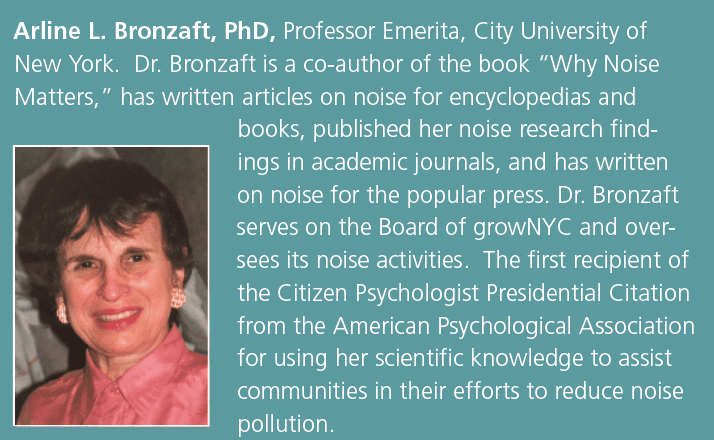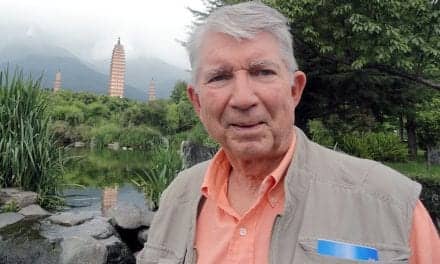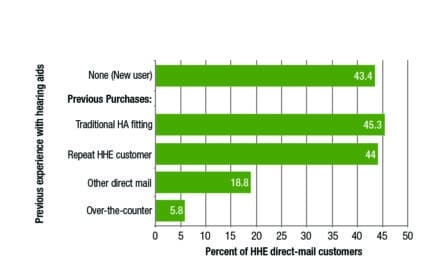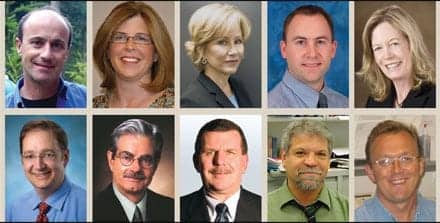Patient Care | August 2022 Hearing Review
Resources for quiet spaces
By Arline L. Bronzaft, PhD
I learned early in my career that researching and writing about the adverse impacts of noise on hearing and mental and physical health was not enough if I cared about reducing noise in our environment. Thus, I became more involved in advocating for lessening environmental noise and enhancing quieter spaces by joining groups with similar interests and working with local communities impacted by noise, especially in urban centers.
In New York City, I serve on the Board of GrowNYC, an organization that supports farmers’ markets and recycling efforts, assists communities with their garden projects, promotes programs for children on the importance of a healthier environment and works with New Yorkers to reduce neighborhood noises. The NYC mayor chooses board members, and I have been asked to serve on the board by five NYC mayors. Going to GrowNYC’s noise site will allow one to learn about the dangers of noise and how to bring greater quiet to oneself and one’s neighbors. Yes, one other thing: you will be informed that should you need personal assistance with a noise problem, you can contact me at GrowNYC. With noise a major NYC complaint, I will let readers of this article know that for over thirty years, I have assisted many New Yorkers with their noise problems, especially neighbor-to-neighbor noise, and have had much success in resolving their noise complaints. GrowNYC has served New Yorkers well concerning reducing noise in their lives.
Over the years, groups and organizations have been formed to deal with the growing noise problem in our world. In NYC, I have assisted local community groups in their efforts to reduce the city’s noise. On a larger scale, I have become affiliated with organizations that are more national in nature. Quiet Communities Inc is a nonprofit group that aims to work with communities throughout the US to reduce harmful environmental noise. The organization has five programs: Quiet American Skies, Quiet Outdoors, Quiet Coalition, Quiet Healthcare, and Quiet Conversation. I am most involved with two of these programs: Quiet American Skies and Quiet Coalition. The Quiet American Skies program works with anti-aircraft noise groups across the United States and assists with their efforts to provide a safer, quieter, and healthier aviation system. The Quiet Coalition is comprised of a group of health, science, and legal professionals concerned about the impacts of noise on health. This group hopes to encourage public officials to study the growing literature on the link between noise and fitness to move forward in introducing public policies to address the issue of noise pollution and provide a quieter and healthier environment.
One of the Quiet Coalition projects focuses on daily blogs providing news and information regarding the science of noise and health. Here, you will find blogs focusing on noise and hearing loss. A recent blog posting by Daniel Fink asked, “Is Hearing Loss an Inevitable Part of Aging?” I also wrote a blog posting about a missed opportunity to discuss hearing loss in interviews given by Dave Grohl of the Foo Fighters. Jan Mayes wrote a post about the noise accompanying the recent Ottawa protests and noted that it might lead to tinnitus in residents subjected to this noise.
Although I had been in contact with Hans Schmid—founder of the Right to Quiet Society, a Canadian organization based in Vancouver—I only recently joined the organization’s board. This group was established to raise public awareness of the dangers of noise pollution to our health and well-being and to advocate for better legislation and the comparable enforcement of this legislation to reduce noise. Right to Quiet, as its name indicates, views quiet as a fundamental human right. Looking at its website, you can learn more about how its efforts have resulted in less noise in Vancouver. Yet, there is still more work to be done, and I am pleased to be part of this organization.
My association with the Center for Hearing and Communication (CHC) in NYC for over 35 years, is more closely related to noise and hearing. In 1996, I was especially pleased to join Nancy Nadler, the deputy executive director of CHC, in initiating International Noise Awareness Day (INAD), which is celebrated on the fourth Wednesday of April. While INAD was a NYC event at its inception, it is now celebrated throughout the United States and globally. Essentially, the message of INAD is that noise harms hearing, mental and physical health, and our quality of life. INAD promotes educating people about the hazards of noise and plotting out actions that each of us can take to lessen noise pollution and enhance quiet.
As an academic, I endorse research, but when it comes to noise, I believe there is sufficient research to link noise to hearing deficits, health issues, and learning loss.

Citation for this article: Bronzaft AL. Organizations building awareness for environmental noise control Hearing Review. 2022;29(8):28.





